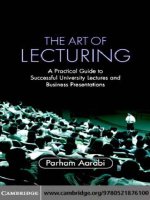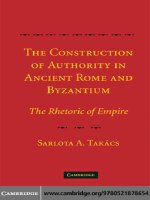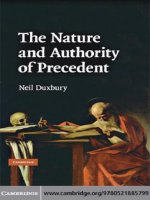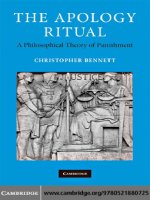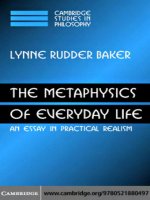0521816556 cambridge university press the health of nations society and law beyond the state dec 2002
Bạn đang xem bản rút gọn của tài liệu. Xem và tải ngay bản đầy đủ của tài liệu tại đây (1.94 MB, 454 trang )
This page intentionally left blank
THE HEALTH OF NATIONS
Society and Law beyond the State
The human world is changing. Old social structures are being overwhelmed by forces of social transformation which are sweeping across
political and cultural frontiers. A social animal is becoming the social
species. The animal that lives in packs and herds (family, corporation,
nation, state . . . ) is becoming a member of a human society which is
the society of all human beings, the society of all societies.
The age-old problems of social life – religious, philosophical, moral,
political, legal, economic – must now be addressed at the level of the
whole species, at the level where all cultures and traditions meet and
will contribute to an exhilarating and hazardous new form of human
self-evolving.
In this book Philip Allott explores the social and legal implications
and potentialities of these developments in the light of the general
theory of society and law which is proposed in his groundbreaking
Eunomia: New Order for a New World.
phil ip a l l ott is Professor of International Public Law in the University of Cambridge and a Fellow of Trinity College, Cambridge. He
was formerly a Legal Counsellor in the British Foreign and Commonwealth Office.
THE HEALTH OF NATIONS
Society and Law beyond the State
PHILIP ALLOTT
The Pitt Building, Trumpington Street, Cambridge, United Kingdom
The Edinburgh Building, Cambridge CB2 2RU, UK
40 West 20th Street, New York, NY 10011-4211, USA
477 Williamstown Road, Port Melbourne, VIC 3207, Australia
Ruiz de Alarcón 13, 28014 Madrid, Spain
Dock House, The Waterfront, Cape Town 8001, South Africa
© Philip Allott 2004
First published in printed format 2002
ISBN 0-511-03054-1 eBook (Adobe Reader)
ISBN 0-521-81655-6 hardback
ISBN 0-521-01680-0 paperback
pathemata mathemata
for my dearest brother Roderick
(1936–1999)
speculum in speculo
Vain is the word of a philosopher which does not heal any suffering of
man. For just as there is no profit in medicine if it does not expel the
disease of the body, so there is no profit in philosophy either, if it does not
expel the suffering of the mind.
Epicurus (341–270 BCE), Fragment 54, in C. Bailey, Epicurus.
The Extant Remains (Oxford, The Clarendon Press; 1926), p. 133.
Natural health is the just proportion, truth, and regular course of things
in a constitution. ’Tis the inward beauty of the body.
Anthony Ashley Cooper, Earl of Shaftesbury (1671–1713),
Characteristics of Men, Manners, Opinions, Times (1711)
(ed. J. M. Robertson; Indianapolis, Indiana University Press; 1964),
ii, pp. 267–8.
Truly, the earth shall yet become a house of healing.
Friedrich Nietzsche (1844–1900), Thus Spake Zarathustra
(tr. R. Hollingdale; Harmondsworth, Penguin; 1961),
pp. 102–3.
CONTENTS
Preface
page ix
Acknowledgements
xv
I.
Society and law
1.
The will to know and the will to power. Theory and moral
responsibility
3
2.
The phenomenon of law
36
I. Making sense of the law. Lawyers and legal philosophy
II. The emerging universal legal system. The law of all laws
III. Deliver us from social evil. International criminal law and
moral order
62
37
56
3.
Globalisation from above. Actualising the ideal through
law
70
4.
The nation as mind politic. The making of the public
mind
97
5.
New Enlightenment. The public mind of all-humanity
II.
European society and its law
6.
European governance and the re-branding
of democracy
161
7.
The crisis of European constitutionalism. Reflections on
a half-revolution
182
vii
132
viii
contents
8.
The concept of European Union. Imagining
the unimagined
229
9.
The conversation that we are. The seven lamps of European
unity
263
III.
International society and its law
10.
The concept of international law
11.
International law and the idea of history
12.
Intergovernmental societies and the idea
of constitutionalism
342
13.
International law and the international Hofmafia. Towards
a sociology of diplomacy
380
14.
International law and international revolution. Reconceiving
the world
399
Index of names
Index of subjects
423
429
289
316
PREFACE
The social species
The landscape of the human world is changing. A social animal is becoming a social species. Human social consciousness is becoming the
social consciousness of the whole human species. Among all the species
of social animals, one species is becoming the social species.
Biological history tells the story of the evolution of the human species
by natural processes. Human history is the story of the self-evolving
of the human species through the work of the human mind. The selfevolving of the human species is a by-product of the self-ordering of
human beings, within the private mind of each human being and within
the public minds of all human societies.
The three co-ordinates of our self-consciousness – as individual human beings, as intermediate societies, as the society of all-humanity – are
the ordering structures of the ceaseless process of our self-constituting
as persons and as societies. As the human species re-creates itself as the
social species, the human mind faces new challenges, new in kind and
new in scale, at every level of human self-constituting, at every level of
human self-consciousness.
Social pathology
We are excited by the new possibilities of human self-constituting at
the level of the species. Unused reserves of human potentiality can be
released and realised, bringing into fruitful collaboration new levels of
human energy, creativity, intelligence, to serve the highest aspirations
and the highest ideals of all-humanity. We know that we will be writing
a new page in the better story of human self-evolving.
We know also that there is another story within human history, the
story of the social effects of evil. The private minds of human beings
ix
x
preface
and the public minds of human societies interact in the process of their
mutual self-constituting. It is a process which is wonderfully productive
and creative but which includes also a vicious cycle of reciprocating
pathology, as every form of human evil is reproduced and magnified at
the social level.
As a social animal becomes the social species, we are anxious about the
new possibilities of social pathology, as social systems take power over
every aspect of all human life everywhere, as they take power over our
minds, our wills, our hopes, our ideals, our species-nature, our speciesconsciousness, and as they take power, finally, over our idea of what it is
to be human. The globalising of human society is also a globalising of
social evil.
Social idealism
Societies constitute themselves in the form of ideas. Nation, state, government, family, war, peace, justice, law, health, happiness. These, and countless others like them, are structures of ideas. We live and die for ideas.
Ideas are the biology of the human mind. As a social animal becomes
the social species, the challenge to the self-creating and self-ordering
human mind has never been greater.
Each human society is an infinitely complex and dynamic structure
of ideas. The health of a society, its degree of well-being, is determined
by the ideas which take actual effect in the process of its day-to-day
self-constituting as a society. To reform or redeem a society is to change
those determining ideas. Our quality of life is a function of the quality
of our ideas.
The unifying theme of the studies contained in the present volume is a
philosophy of social idealism, a belief in the capacity of the human mind
to transcend itself in thought, to take power over the human future, to
choose the human future, to make the human future conform to our
ideals, to our best ideas of what we are and what we might be.
Practical theory
The ideas which take actual effect in the process of day-to-day social
self-constituting are, in the first place, what we may call practical theory.
Practical theory is a society’s way of explaining itself to itself, explicitly
preface
xi
or implicitly, in the course of its everyday activity. As a carpenter applies
practical theory to the making of a table, so a society applies practical
theory to the making of its own social reality.
Behind practical theory lies what we may call pure theory, a society’s
way of explaining its practical theory to itself. A theocracy may explain
itself in terms of a particular religion. A democracy may explain itself
in terms of a particular theory of social contract. A capitalist society
may explain itself in terms of a particular theory of human behaviour. A
geometer can explain the pure theory of the carpenter’s practical theory.
Behind pure theory lies what we may call transcendental theory, a theory
of theory, our way of explaining to ourselves the nature of explanation,
the nature of ideas, the nature of the mind.
In Eunomia. New Order for a New World,1 I have sought to provide, at
the levels of transcendental and pure theory, a philosophical basis for the
new international society, the society of all human beings, the society of
all societies. The essays in the present volume are intended to provide
the groundwork of the possible practical theory of the new international
society, that is, the practical theory of the social self-constituting of
humanity at the level which lies beyond the self-constituting of states
and nations.
Law
In the drama of a society’s self-constituting, law plays the leading structural role. It is for this reason that the future of international law is
crucial to the future of international society. The interaction of social
reality and society’s ideas produces law, so that law can act as the anatomy
and the physiology of the body politic within which social reality can
develop in co-operation with society’s ideas.
Law creates an infinitely complex network of legal relations linking
every single member of a society with all other members – relations of
a relatively settled character, conditioning human behaviour, individual and social, within relatively settled limits. In this way, social reality
develops, within relatively settled limits, in accordance with society’s
ideas as they are enacted in the law and as they are expressed through
its day-to-day interpretation and application.
1
Throughout the present volume, references to ‘Eunomia’ are to P. Allott, Eunomia. New Order
for a New World (Oxford, Oxford University Press; 1990/2001).
xii
preface
In the European Union, an attempt has been made to transcend the
society of nation and state by constructing a complex legal system, enacting and expressing certain political and economic ideas. The grave
problems besetting the process of European integration prefigure the
problems which will beset the self-constituting of an international society which is self-consciously the society of all societies, transcending
all subordinate forms of society.
The challenge of creating purposively a new European social reality
formed by and forming a new kind of European public mind is mirrored
and greatly magnified at the level of international society. The problem
of creating the theoretical basis for a true international law of a true
international society, formed by and forming a new public mind of allhumanity, is as daunting as it is exhilarating.
The other human future
Humanity cannot continue on its present self-destructive course, a
course determined and distorted by large-scale socio-pathological
phenomena – scandalous social injustice, chronic instability and violence
within and between societies, widespread and deep-rooted public-realm
corruption, the dehumanising of the human individual by morbid social
forces.
Human self-perfecting through the unlimited potentiality of the better forms of human self-socialising remains as a permanent challenge,
in an everlasting struggle between public good and public evil. Humanity’s capacity for such self-transcending depends on the ideas which it
forms of itself and of its possibilities, of its reality and its ideals. The
present volume seeks to assist in the making of a better human future
by contributing to that necessary process of human self-imagining and
self-creating.
Method
This volume is radically syncretic in aspiration, drawing together ideas
from many different fields. A major purpose is to encourage younger
scholars and intellectuals, in particular, to have the courage to cross the
arbitrary and artificial mental frontiers which have done so much harm
to the creative potentiality of the human mind. Holistic diseases of the
preface
xiii
human world need homeopathic remedies produced from within the
total potentiality of the human mind.
The author’s hope is that younger scholars and intellectuals, in particular, will be inspired to reconnect with their intellectual inheritance,
to explore new and better lines of thought, to search out new and better
connections between ideas, ideas which may still be of redemptive value
even if they are ancient ideas. Nothing could be more necessary or more
urgent. Knowledge is not merely to be known, but also to be used.
Dare to think! Dare to know! Dare to speak! Dare to hope!
Trinity College, Cambridge
ACKNOWLEDGEMENTS
The following chapters of the present volume are revised versions
(in some cases, substantially revised versions) of chapters or articles
published elsewhere and published here with any necessary copyright
permission.
Chapter 1. ‘Kant or won’t? Theory and moral responsibility’: The
British International Studies Association Lecture 1995, revised version
in 23 Review of International Studies (1997). Chapter 2. ‘Making sense of
the law. Lawyers and legal philosophy’: in 108 Cambridge Review (1987).
‘L´ıbranos del mal social’ (Deliver us from Social Evil): in 221 Revista de
Occidente (1999) (special Pinochet number). ‘The Emerging universal
legal system’: in 3 International Law Association FORUM de l’Association
du Droit International (2001), 12. Chapter 3. ‘Globalization from above.
Actualizing the ideal through law’: in 26 Review of International Studies
(2000). Chapter 4. ‘The nation as mind politic’: in 24 Journal of International Law and Politics (1992). Chapter 5. ‘Law and the re-making
of humanity’: in N. Dorsen and P. Gifford (eds.), Democracy and the
Rule of Law (Washington, DC, CQ Press; 2001). Chapter 6. ‘European
governance and the re-branding of democracy’: in 27 European Law
Review (2002). Chapter 7. ‘The crisis of European constitutionalism.
Reflections on the revolution in Europe’: in 34 Common Market Law
Review (1997). Chapter 8. ‘The concept of European Union. Imagining the unimagined’: in 2 Cambridge Yearbook of European Legal Studies
(2000). Chapter 9. ‘The conversation that we are. The seven lamps of
European Unity’: in H. Cavanna (ed.), Governance, Globalization and
the European Union (Dublin, Four Courts Press; 2002). Chapter 10. ‘The
concept of international law’: in 10 European Journal of International Law
(1999); and in M. Byers (ed.), The Role of Law in International Politics.
Essays in International Relations and International Law (Oxford, Oxford
University Press; 2000). Chapter 11. ‘International law and the idea
xv
xvi
acknowledgements
of history’: in 1 Journal of the History of International Law (1999), 1.
Chapter 12. ‘Intergovernmental societies and the idea of constitutionalism’: in V. Heiskanen and J.-M. Coicaud (eds.), The Legitimacy of
International Organizations (Tokyo, United Nations University Press;
2001). Chapter 13. ‘International law and the international Hofmafia.
Towards a sociology of diplomacy’: in W. Benedek, H. Isak and R. Kicker
(eds.), Development and Developing International and European Law
(Frankfurt-am-Main, Peter Lang; 1999). Chapter 14. ‘International law
and international revolution. Re-conceiving the world’: Josephine
Onoh Memorial Lecture 1989 (Hull, Hull University Press; 1989; and
in D. Freestone, S. Subedi and S. Davidson (eds.), Contemporary Issues
in International Law (The Hague, Kluwer Law International; 2002)).
PART I
Society and law
What is society? What is law?
1
The will to know and the will to power
Theory and moral responsibility
Theory and Istopia – Theory and society – Theory and
the university – Theory and the philosophers – Theory and
imagination – Theory and pathology – Theory and Eutopia
Given the role that ideas play within the self-constituting of human beings
and human societies, what is the social responsibility and what is the moral
responsibility of those whose function in the social division of labour is to
think, the social engineers of human consciousness?
They cannot claim that the supposed ideal of intellectual objectivity absolves them from social and moral responsibility, if they claim that intellectual
objectivity requires them to treat the actual – actual social and moral concepts, actual social and moral values, actual social and moral behaviour – as
inevitable, rational and self-justifying.
Thinking in a social context is necessarily moral action, because it is liable to determine the lives of those whose consciousness is modified by that
thinking, that is to say, by ideas acting as social forces. Our general social
and responsibility now includes a duty to re-imagine the human world and
human reality in the light of new ideas and new ideals.
Theory and Istopia
1.1 The human world is humanity’s self-made habitat, a mind-world
created by the human mind from its own substance. The reality of the
human world is a species-specific reality made by human beings for
human beings. The history of the human world is the history of the
making of human reality, a self-consciousness of the self-creating activity
of human consciousness, the mind’s mirror of the mind. To say such a
thing is not merely to take a certain view of the metaphysics of history or
3
4
society and law
of the epistemology of historiography, aligning oneself, perhaps, with
a sect of idealist historians.1 To say such a thing is itself a significant
event within the history of the making of human reality, an event whose
ironical power is centred in the word is. To say what is is to change human
reality.
1.2 The human world is constructed from the word is, an Istopia.
The master-builders of Istopia are those whose task in the social division
of labour is the fabrication of is-sentences. A special burden of social
and moral responsibility rests on the shoulders of those of us who are
paid to think in the public interest, the social engineers of the human
mind-world.
1.3 To change human consciousness is to change human reality. To
change human reality is to change the course of human history.2 It
1
2
Aligning oneself, perhaps, with R. G. Collingwood. ‘All history is the history of thought.’
‘Historical knowledge is the knowledge of what mind has done in the past, and at the same
time it is the redoing of this, the perpetuation of past acts into the present.’ The Idea of History
(Oxford, Oxford University Press; 1946), pp. 215, 218. In An Autobiography (Oxford, Oxford
University Press; 1939), Collingwood said: ‘My life’s work . . . has been in the main an attempt
to bring about a rapprochement between philosophy and history’ (p. 77). Collingwood
was influenced by the Italian philosopher-historian Benedetto Croce (1866–1952), who had
taken up from Vico and Hegel the idea of historiography as the history of the actualising
of consciousness, inextricably linking ideas and events, the ideal and the real. For further
discussion of the history of historiography, see ch. 11 below.
Ernst Cassirer, another philosopher-historian, aligned himself with Voltaire in proposing
that ‘the true object of history is the story of the mind’. E. Cassirer, The Philosophy of the
Enlightenment (1932) (trs F. Koelln and J. Pettegrove; Princeton, Princeton University Press;
1951), p. 217. Cassirer contrasts Voltaire with Montesquieu, for whom political events still
occupy the centre of the historical world, and the spirit of history coincides with the spirit
of the laws: ‘In Voltaire, on the other hand, the concept of mind has gained broader scope.
It comprises the entire process of inner life, the sum total of the transformations through
which humanity must pass before it can arrive at knowledge and consciousness of itself. The
real purpose of the Essay on Manners is to reveal the gradual progress of mankind toward
this goal and the obstacles which must be overcome before it can be reached.’ Voltaire’s Essai
sur les moeurs et l’esprit des nations (Essay on the manners and the spirit [mind] of nations)
(1756) was published eight years after Montesquieu’s De l’esprit des lois (The Spirit of the
Laws).
‘Every day I become more convinced that theoretical work achieves more than practical
work. When the realm of representation [Vorstellung] is revolutionised, reality cannot hold
out.’ G. W. F. Hegel, letter to Niethammer (23.X.1808), in J. Hoffmeister (ed.), Briefe von und
an Hegel (Hamburg, Meiner; 1962–81), i, pp. 253–4 (present author’s translation). ‘Without
revolutionary theory there can be no revolutionary movement.’ V. I. Lenin, What is to be
Done? (1902) (Moscow, Progress Publishers; 1947), p. 25. Lenin quotes F. Engels: ‘Without
German philosophy, which preceded it, particularly that of Hegel, German scientific
socialism – the only scientific socialism that has ever existed – would never have come
into being’ (p. 27).
the will to know and the will to power
5
follows that, if it is our purpose to make a new human reality, we must
find a way to stimulate the self-consciousness, the sense of social responsibility, the moral awareness, and the intellectual creativity of the ruling
class of Istopia and, especially, of those who hold responsible positions in
the mental service-industries – religion, politics, administration, commerce, the law, mathematics and the natural sciences, literature and the
fine arts, the media of information and entertainment. It is they whose
responsibility is not merely to imagine a new human reality but also to
transform the human world as it is into the human world as it will be.
1.4 Thinking in the public interest is a social function which rests
on two far-reaching philosophical assumptions. In the first place, we
thinkers are saying that reality is not as it is but as we conceive it to be.
Secondly, we are saying that reality as we conceive it to be is a possible
human world, a world we human beings can choose to inhabit.
1.5 The assumptions underlying all public thinking are, for most
people and for most of the time, subliminal, but they are not unconsidered and they are certainly not uncontroversial. The history of philosophy in the particular tradition established in Greece by the end of the
fourth century BCE is the history of the self-contemplating of human
consciousness, a history of human consciousness considering the possibility of human consciousness. It is, in particular, the history of the
work of those whose function in the social division of labour is to think
about thinking, that is to say, of philosophers, of those who think about
what thinking is.3
1.6 We may call it the Parmenides Moment, that moment of selfenlightenment when the self-examining human mind recognises the
problem of what it is to say that anything is, whether we say it of a god
or gods, of justice, of the state, of our own being, of our own mind.
And, for each human being, the Parmenides Moment is an ever-present
3
Hegel referred to philosophy as ‘the Thinking of Thinking’, in the Introduction to The
Philosophy of History (tr. J. Sibree; New York, Dover Publications; 1956), p. 69. He took
the view that ‘history’, as opposed to historiography, is the march of the Universal Spirit
towards Freedom.
Summarising his own philosophy of history, Ernst Cassirer said: ‘Human culture taken
as a whole may be described as the process of man’s progressive self-liberation. Language,
art, religion, science, are various phases in this process. In all of them man discovers and
proves a new power – the power to build up a world of his own, an “ideal” world. Philosophy
cannot give up its search for a fundamental unity in this ideal world.’ An Essay on Man.
An Introduction to a Philosophy of Human Culture (New Haven, Yale University Press; 1944),
p. 228.
6
society and law
possibility of self-enlightenment. We ourselves may never experience it.
Or, having experienced it, we may choose to ignore it. But humanity cannot escape from it. The human mind cannot unthink the self-imposed
problem of its own functioning.4
1.7 We perceive. We conceive. We become. We speak. Such is one possible expression of the reality of our reality-forming capacity. It is an expression which can be constructed as a product of twenty-seven centuries
of the great philosophical tradition, as a product especially of the intense
self-examining of the human mind in the period since the enlightenment
of the twelfth century, when the residues of the thought of Greece and
Rome became available again to intellectuals throughout Europe. The
human mind accumulates its self-consciousness. We are the ever-entitled
beneficiaries of that inheritance, able to draw on the current state of that
accumulation at any time. The possible progress of the human mind is
the potentiality of its self-consciousness at any given time.
1.8 We perceive. If being is the way in which some part of reality
presents itself to us, then it is possible to take the view (traditionally
associated with the iconic name of George Berkeley)5 that, at least so far
as we humans are concerned, being is nothing more than being perceived
by us. To be is to be perceived. Perceived reality is in the mind of the
perceiver. We perceive reality.
1.9 We conceive. If perceiving is an activity of the mind, then it is
possible to take the view (traditionally associated with the iconic name
of Immanuel Kant)6 that it is something in the self-ordering of the mind
which allows it to conceive reality as an orderly world – a world of space
4
5
6
The obscure and intriguing ideas of Parmenides (c. 515–c. 440 BCE) inspired several different branches of Greek philosophy by raising the problem of being through denying the
possibility of talking about not-being. Does this mean that by saying that something ‘is’ we
are necessarily saying that it exists other than as a thought in our minds? For a variety of
interpretations of his ideas, see F. M. Cornford, 27 The Classical Quarterly (1933), pp. 97–
110; M. Furth, ‘Elements of eleatic ontology’, in 6 Journal of the History of Philosophy (1968),
pp. 111–32; S. Austin, Parmenides – Being, Bounds, and Logic (New Haven, Yale University
Press; 1986); L. Brown, ‘The verb “to be” in Greek philosophy: some remarks’, in Language
(Companions to Ancient Thought 3) (ed. S. Everson; Cambridge, Cambridge University Press;
1994), pp. 212–36. Plato discusses ideas attributed to Parmenides in two of his dialogues:
The Sophist and Parmenides.
George Berkeley (1685–1753) took the extreme ‘idealist’ position that, since the mind can
only know its own contents, including the perceptions based on the data of the senses, the
only reality we can know is the reality of our own thinking.
Immanuel Kant (1724–1804), seeking to reconcile idealism and empiricism, supposed an
interactive effort between the ordering capacity of the mind and the putative order of a
putative non-mind reality.
the will to know and the will to power
7
and time, of energy, things, persons, life, death. To be is to be conceived.
Conceived reality is reality remade in the mind of the conceiver. We
conceive reality.
1.10 We become. If our perceiving of reality and our conceiving of
reality are an interactive activity between the human mind and what we
conceive of as reality, then it is possible to take the view (traditionally
associated with the iconic name of G. W. F. Hegel)7 that the making of
human reality is itself a part of the continuous self-ordering of reality. To
think is to become. Reality-for-us is a process of reality’s self-constituting
within human consciousness. We become reality.
1.11 We speak. If our making of human reality is an activity of mind,
it is also an activity of minds. We think socially. The human mind has
recognised the idea (now commonly associated, in particular, with the
iconic name of Karl Marx)8 that a society of human beings is a socialising of thinking and not merely a socialising of action. And we must take
account of the view (now commonly associated, in particular, with the
name of Ludwig Wittgenstein)9 that the reality-for-us which is formed
when human minds communicate with each other has characteristics
which are determined not merely by the mind’s capacity for perceiving
and conceiving and becoming reality. It is determined also by the particular nature, and limitations, of our capacity to communicate. To speak
is to act. To be is to be spoken about. In speaking about the world-thatis-for-me we make the world-that-is-for-us. We speak reality.
1.12 Such is the unprecedented self-consciousness of the human
mind which is available to us as an inheritance at the beginning of the
twenty-first century. We possess a form of philosophical self-consciousness which has not been available to any of our predecessors. Our
intellectual inheritance is also an intellectual burden. We cannot unthink
7
8
9
Georg Wilhelm Friedrich Hegel (1770–1831), in what was intended as a final reconciliation
of idealism and empiricism, supposed that mind and what seems to be a non-mind reality
are aspects of a third thing (Geist ; Spirit or Mind) which manifests itself as inter alia an active
force in both human thought and the products of human thought (human history).
Karl Marx (1818–83), in what was intended as a final reconciliation of idealism and materialism, took the view that the activity of the human mind cannot be separated from the rest
of human-made reality, in particular that part of human reality which involves the transformation by human beings of material reality. Theory is practice and practice is theory.
Ludwig Wittgenstein (1889–1951) reflected a general crisis in the self-examining of the
human mind, a crisis which concerned the status of all kinds of knowledge, including even
the knowledge generated by the natural sciences. How can the human mind transcend itself
to find the grounds of its ideas of truth and value when those ideas themselves are merely
products of the mind?
